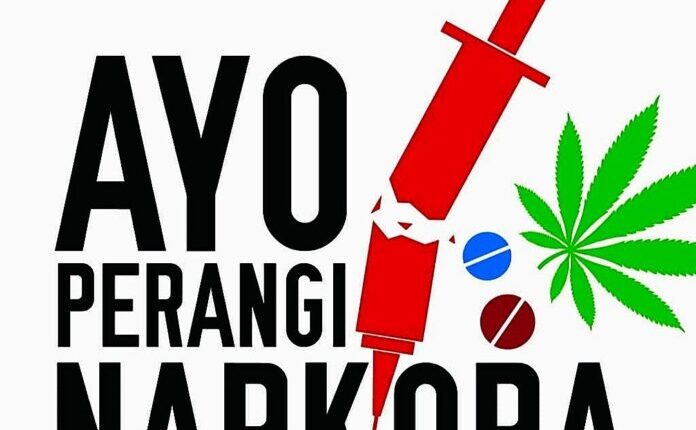Prabowo-Gibran Government Committed to Saving Young Generation from Drugs
By: Sahroni Anzar *)
The Prabowo-Gibran government is moving with determination to ensure that Indonesia’s future is free from the shadow of drugs that threaten the younger generation. Amid the rampant drug abuse that is infecting teenagers throughout the country, this commitment is a hope for millions of families who long for a healthy environment for their children. Not only as an effort to enforce the law, but also as a form of social responsibility, the government is intensifying various prevention and empowerment programs, so that every young generation has a strong fortress against the bad influence of drugs. Through structured policies, ranging from increasing the role of the family to community supervision, the government is trying to fortify the future of the nation from this threat.
Based on data submitted by the Head of the National Narcotics Agency (BNN) Commissioner General of Police. Marthinus Hukom recently, around 312 thousand Indonesian teenagers are caught in drug abuse. This astonishing figure provides an illustration of the urgency of this problem, especially with the main factors behind drug use among teenagers, namely curiosity and peer influence.
The Prabowo-Gibran government is trying to address this issue through a comprehensive approach, including fostering the environment and family as the first line of defense. The government fully supports the Drug-Free Village (Desa Bersinar) program initiated by the BNN, which aims to make villages throughout Indonesia safe from drugs. This program includes strengthening the role of families and local communities to provide more effective supervision and support for teenagers. The government emphasizes the importance of a healthy and positive environment for the younger generation as an effort to keep them away from drugs.
On the other hand, the Deputy for Youth Empowerment from the Ministry of Youth and Sports, Prof. Dr. HM Asrorun Ni’am Sholeh, MA, stated that in addition to drugs, the habit of smoking also needs to be suppressed because it is one of the entry points for the abuse of other addictive substances. The government is encouraging a decrease in the prevalence of smoking as a preventive measure, especially through programs and forums such as the 2024 National Forum for Youth Core Cadres Against Drugs (KIPAN). KIPAN focuses on increasing the capacity of youth cadres who have a strategic role in inviting peers to stay away from drugs and cigarettes. The government hopes that Indonesian youth can be the spearhead of social change by educating and influencing their surroundings to live healthily.
The government understands that the influence of drugs can be very destructive, not only for individuals, but also for the future of the nation as a whole. This commitment is evident from various policies taken, including in the planning and strengthening of cross-sectoral policies to prevent drug abuse among teenagers. The government also highlights the social and economic impacts of drug use, which often cause loss of productivity and increase social burdens. For this reason, this prevention program does not only talk about individuals, but also about improving the structure of society to be healthier and protected from the dangers of drugs.
In a broader context, inter-agency coordination is increasingly strengthened to face more complex challenges in eradicating drugs. The Coordinator of the East Java High Prosecutor’s Office for General Crimes, Evelin Nur Agusta, SH., MH, in the Criminal Justice System Coordination Meeting, emphasized the importance of cross-agency collaboration, including the prosecutor’s office, police, and correctional institutions, to combat drugs effectively. This effort is expected to provide a deterrent effect for perpetrators and prevent drug abuse among vulnerable youth.
In addition, government efforts are not only limited to eradication, but also involve prevention aspects. This commitment includes counseling, education, and involvement of youth as agents of change in the anti-drug campaign. The government considers that education and counseling at an early age are very important to shape the awareness of the younger generation about the dangers of drugs. This is where the role of families, schools, and religious institutions becomes very vital in providing understanding and values that keep them away from the temptation to try drugs.
The government, through collaboration with the BNN and other related institutions, is trying to ensure that the younger generation has adequate information about the risks of drugs. They are made aware that once caught in drug abuse, it will be very difficult for someone to escape from this dangerous addiction. The government also provides rehabilitation support for drug users, because it understands that rescue does not only stop at prevention, but also at handling existing cases.
With these strategic efforts, the Prabowo-Gibran government hopes to build a healthy, drug-free, and highly competitive young generation. The government realizes that the success of this agenda requires cooperation between the government, society, and the young generation itself. Every individual and family is expected to have an active role in supervising and accompanying the young generation so that they do not fall into the trap of drugs.
In the future, the government will also continue to develop innovative programs and target the younger generation so that they not only stay away from drugs, but also become pioneers in building a positive and healthy environment. With a consistent and strong commitment, the government is optimistic that Indonesia can achieve the vision of Golden Indonesia 2045 with a superior, productive young generation that is free from the threat of drugs.
*) Social Observer from Muda Karya Research Center
